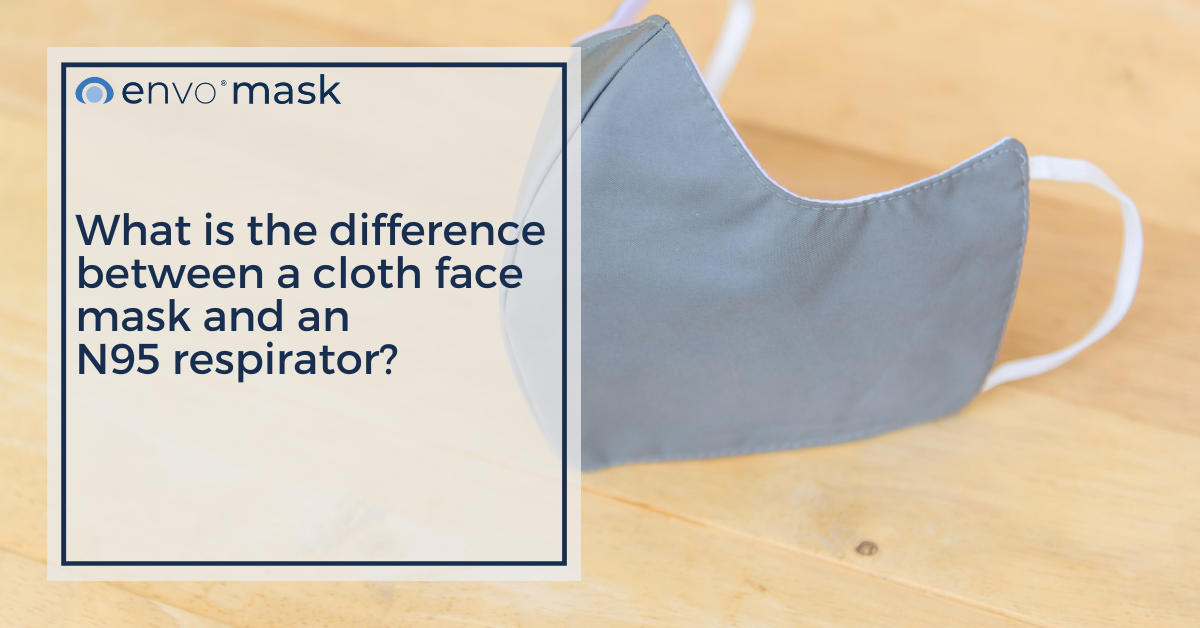At the beginning of the COVID-19 pandemic in the United States, the general public was urged to wear cloth masks and N95 respirators as a safeguard against contracting the virus. As N95 respirators became scarce and the government reserved them for essential workers, cloth masks became the standard for the general public by the Summer of 2020. However, the evolution of public health guidance and the emergence of new variants has called into question the efficacy of cloth face masks.
Updated masking recommendations from the Centers for Disease Control and Prevention (CDC) suggest that not all masks are created equal when it comes to providing you, your family, and your workforce with adequate defenses. To that end, the latest guidance from the CDC states, “Loosely woven cloth products provide the least protection, layered finely woven products offer more protection, well-fitting disposable surgical masks, and KN95s offer even more protection, and well-fitting NIOSH-approved respirators (including N95s) offer the highest level of protection.” The National Institute for Occupational Safety and Health, known as NIOSH, is a research institute within the Centers for Disease Control and Prevention (CDC).
As the conversation around mask efficacy continues to play out in the mainstream media and among the general public, the time is now to learn about the difference between cloth face masks and N95 respirators. Cloth face masks differ from N95-approved respirators on two major fronts—air filtration and fit. Continue reading for a deeper dive into these nuances.
Air Filtration
According to the CDC, “Respirators are made to protect you by filtering the air and fitting closely on the face to filter out particles, including the virus that causes COVID-19. They can also contain droplets and particles you breathe, cough, or sneeze out so you do not spread them to others.”
N95-certified respirators have a minimum filter efficiency of 95% for 0.3 micron particles at NIOSH test conditions, safeguarding the wearer from small-particle aerosols and more sizable droplets alike. N95 filters are tested with particles in the most penetrating particle size and at high flow rates. Specifically, an N95 rated respirator’s filtration of small-particle aerosols is facilitated through its non-woven polypropylene fibers which feature an electrostatic charge.
In terms of design, the construction of cloth face coverings consists of either a sole layer or numerous woven and/or knit fabric layers that are interlaced. While these face coverings can be effective to varying degrees at filtering out more sizable droplets, small-particle aerosols can easily penetrate the masks. Cloth face mask materials lack an electrostatic charge. These factors compromise the capacity of cloth masks to prevent filter penetration.
Most N95 filters consist of non-woven electrostatically charged polypropylene fibers. The electrostatic charge makes the filter effective at collecting all particle sizes while keeping breathing resistance low. Once a filter collects a particle, it holds it tightly, making it difficult to dislodge or remove.
Cloth masks consist of woven material. Several layers or thick cloth material are needed to achieve high particle collection with a cloth mask. However, more layers or thick material make it more difficult to breathe through a cloth mask. That is not a problem with N95 respirators.
Fit
Respirators are designed to offer a tight-fitting seal, preventing gaps between the facepiece and the wearer’s face. Most cloth face masks do not provide the wearer with a face-seal fit, enabling airborne particles to enter and exit around the edges, in addition to through the filter. Cloth face coverings have a less close and less tight fit when examined against N95-approved respirators or masks, resulting in the former’s diminished capacity to guard against inward and outward leakage.
Outward leakage, or particles exhaled by a source exiting the facepiece, also known as source control, has been an important issue during the pandemic. Cloth masks were thought to protect other people by preventing large droplets from escaping during coughing or sneezing. Today we know that people exhale many smaller particles when they are breathing, talking, sneezing, etc. These smaller particles remain airborne for many minutes or hours, are easily dispersed throughout an indoor space, and are easily inhaled. Cloth masks do not prevent inhalation or emission of these smaller particles and thus offer very limited source control and personal protection.
N95 respirators provide superior air filtration and are designed to achieve a tighter-fitting seal in comparison to cloth face masks. In doing so, N95 respirators safeguard wearers against potential harm from small-particle aerosols and more sizable droplets originating from viruses, construction dust, pollution, wildfire smoke, and so on. As well, if well-fitting, they will prevent outward leakage of small infectious particles from an infected wearer.
Crucial differences between respirators and cloth masks include filter performance, breathing resistance, and fit. Respirators are designed and expected to prevent gaps between the product and the wearer’s face, resulting in a tight-fitting face seal. Cloth masks are not designed to fit or seal onto the face. Even if they fit snugly against the face, there will still be a lot of particle leakage through the fabric. Good fit, or low leakage of particles around the facepiece, is only possible if the filter is highly efficient (like an N95 respirator filter) and the breathing resistance is low. Cloth masks may be easy to breathe through, but their filters do not collect particles with high efficiency, and they don’t prevent leakage around the facepiece.
Visit the envo mask store today to purchase a NIOSH-certified N95 respirator mask. Whether you’re at work or on the move, this respirator can keep you safe, comfortable, and healthy.
